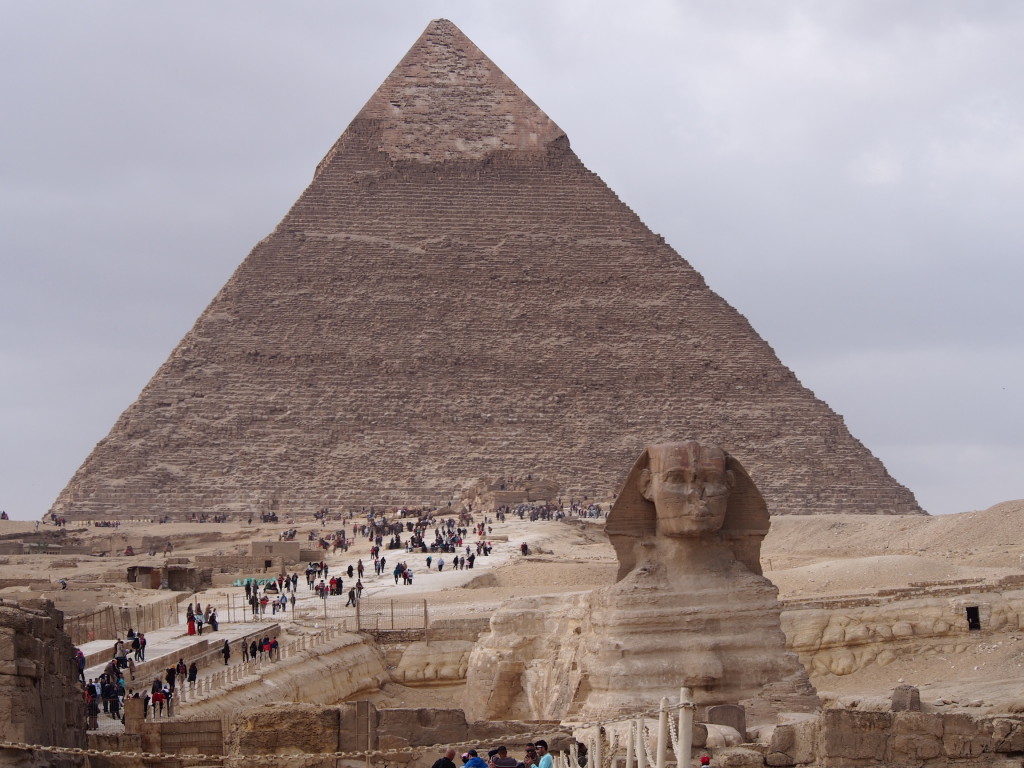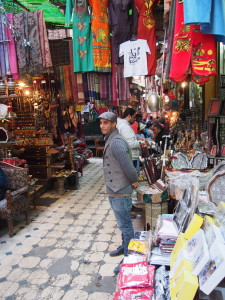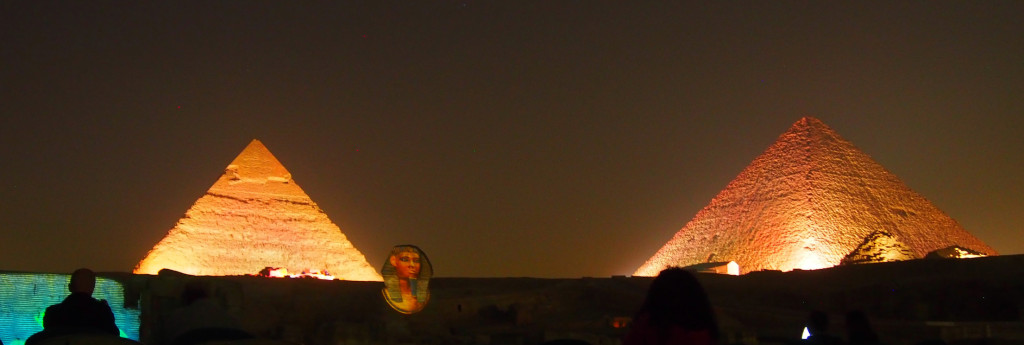My trip to Egypt was part of a Travel Talk tour of Egypt & Jordan. Within Egypt there were four main places we visited, Cairo, Luxor, Aswan and Dahab. Egypt has a population of around 91 million, approximately 22 million of who live in Cairo.
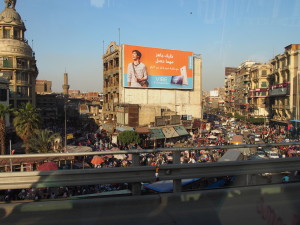 On arrival in Cairo I was met by the Travel Talk driver Baseem, who helped me with the arrival visa and security. Before entering the security line, on the right are some banks where you pay US$25 to buy a single entry visa. You stick the visa sticker on a blank page, which gets stamped as you pass through security.
On arrival in Cairo I was met by the Travel Talk driver Baseem, who helped me with the arrival visa and security. Before entering the security line, on the right are some banks where you pay US$25 to buy a single entry visa. You stick the visa sticker on a blank page, which gets stamped as you pass through security.
Out on the roads, I was unsurprised to discover that Cairo roads are absolute mayhem. You duck and weave between cars and trucks, tooting the horn to prevent being side swiped by another vehicle. There is always one more lane of cars than marked lanes on the road. People occasionally pull over on an outer lane of the highway to wash their car or chat to someone else. Motorcyclists plow through the mess without care for helmets or any kind of safety. Pedestrians run across the highway at random, even mothers with babies seem to have no fear running across multiple lanes of crazy traffic. It was an interesting welcome to Cairo.
Cairo, Giza and New Cairo are all parts of greater Cairo. Cairo and Giza are the two main areas visited by tourists, and the Nile River separates them.
On day one the tour guide Mega introduced himself to the group and with great enthusiasm and love for his country and history he took us on our Egyptian adventure.
The Pyramids of Giza
As most people are aware the Ancient Egyptians believed in reincarnation and that they worshipped many gods including the sun. The concept of reincarnation comes from the sun as it rises (is born) every morning in the east and it ‘dies’ at the end of every day in the west, to rise again the next day. For this reason, all tombs are built on the West Bank of the Nile, the body is buried on the West, so that it may rise again in the East. In alignment with this belief all pyramids were built on the West Bank of the Nile. For those that haven’t established the link, all pyramids are the tombs of Kings.
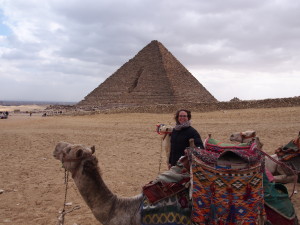 It is not part of the pyramids of Giza complex, but the first pyramid we visited was Sakkara. There are several pyramids in the complex. The most famous one is the Pyramid of Djoser. Djoser has a stepped construction and was one of the first pyramids ever constructed.
It is not part of the pyramids of Giza complex, but the first pyramid we visited was Sakkara. There are several pyramids in the complex. The most famous one is the Pyramid of Djoser. Djoser has a stepped construction and was one of the first pyramids ever constructed.
Within the Pyramids of Giza complex are also several pyramids, though the design is more refined and doesn’t display the stepped construction seen at Sakkara. Some of the pyramids show the remains of a smooth rendering over the top of the construction.
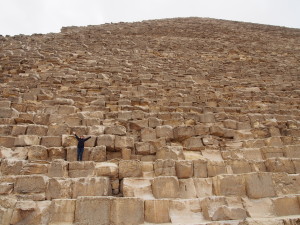 The Great Pyramid of Cheops is the largest of all the pyramids, with a height of approximately 149 metres. It is one of the original Seven Wonders of the World, and was the world’s tallest construction until the Eiffel Tower was built. King Cheops was one of the most loved Kings of ancient Egypt and to the people of Egypt it seems fitting that he is celebrated with such a magnificent monument.
The Great Pyramid of Cheops is the largest of all the pyramids, with a height of approximately 149 metres. It is one of the original Seven Wonders of the World, and was the world’s tallest construction until the Eiffel Tower was built. King Cheops was one of the most loved Kings of ancient Egypt and to the people of Egypt it seems fitting that he is celebrated with such a magnificent monument.
The other pyramids in the area belong to Cheops’ family members, son, wife and sister. The famous Sphinx guards the area. The Sphinx has a construction of a lion’s body with the head of a man. The head of a man represents wisdom and the body of a lion, representative of strength or power.
The site is spectacular to visit. It is so challenging to understand how people in ancient times were able to build such immense structures. I felt awed to be a witness to such creativity and display of ingenuity.
In addition to wandering around the complex, I enjoyed a short camel ride around the site, to get some fun photos!
Cost of Sakkara and Giza: 160EGP
Cost of Camel Ride: 50EGP (from memory)
Cairo Museum
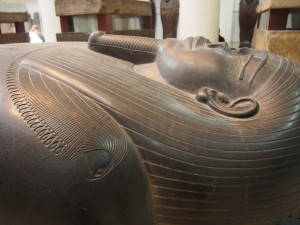 Cairo Museum is certainly worth a visit to see many ancient Egyptian artifacts. Many of the treasures found in the tomb of Tutankhamen can be viewed here. You can also see the mummified bodies of many of Egypt’s great rulers of ancient times, including the most important pharaoh in history Ramses II.
Cairo Museum is certainly worth a visit to see many ancient Egyptian artifacts. Many of the treasures found in the tomb of Tutankhamen can be viewed here. You can also see the mummified bodies of many of Egypt’s great rulers of ancient times, including the most important pharaoh in history Ramses II.
Be aware that if you want to take your camera into the museum you need to pay an additional 50EGP. You can leave the camera in a storage space for free. We were advised it was very secure, but with stories of theft out of safe storage spaces at other sites, we decided against this.
Cost: 85EGP
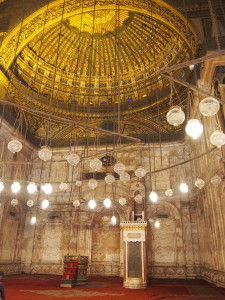 Mohammed Ali Mosque
Mohammed Ali Mosque
The Mohammed Ali Mosque is in the old citadel overlooking the city of Cairo. It’s alabaster walls and meticulously designed interior are absolutely gorgeous. While I probably wouldn’t have put it high on my “to see” list, it was a thoroughly enjoyable place to visit.
Cost: 60EGP
Cairo Markets
Around Cairo downtown are many different markets where you can buy souvenirs. I would recommend visiting at least one or two. Be prepared to haggle, but don’t engage in discussion on price unless it is something you are actually willing to buy.
They are some fabulous jewellery stalls which can create rings, bracelets and pendants with a cartouche of your name in hieroglyphics.
Pyramid Light and Sound Show
At the Pyramids of Giza there is a nighttime Light and Sound show. It’s a little bit cheesy, but otherwise fantastic. I did this at the end of my tour and they presented a reasonable summary of the Egyptian history I had learned throughout the tour, which pulled together the information nicely for me.
It was fun to see the pyramids and sphinx lit up with various different colours. If you are on a budget, I would not recommend going, but otherwise it’s quite a bit of fun.
Cost: 170EGP
Check out my Cairo photos on Flickr
As the wifi in Egypt has been very poor, the album is not yet complete – I will add the remaining Cairo photos as soon as I can.

